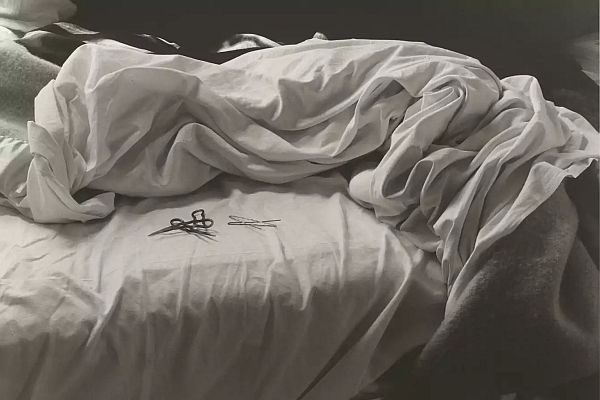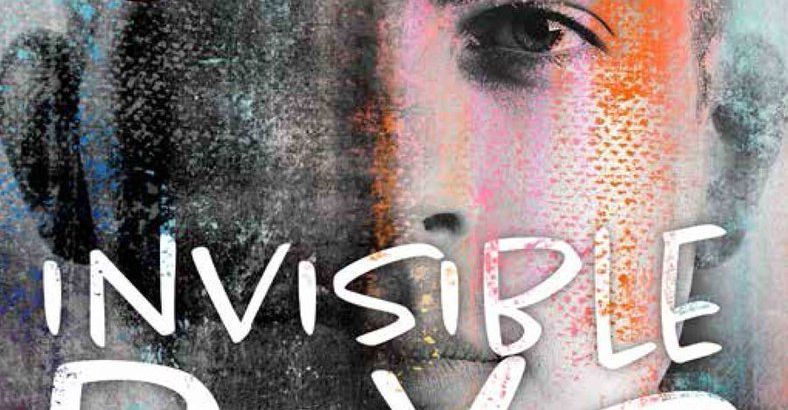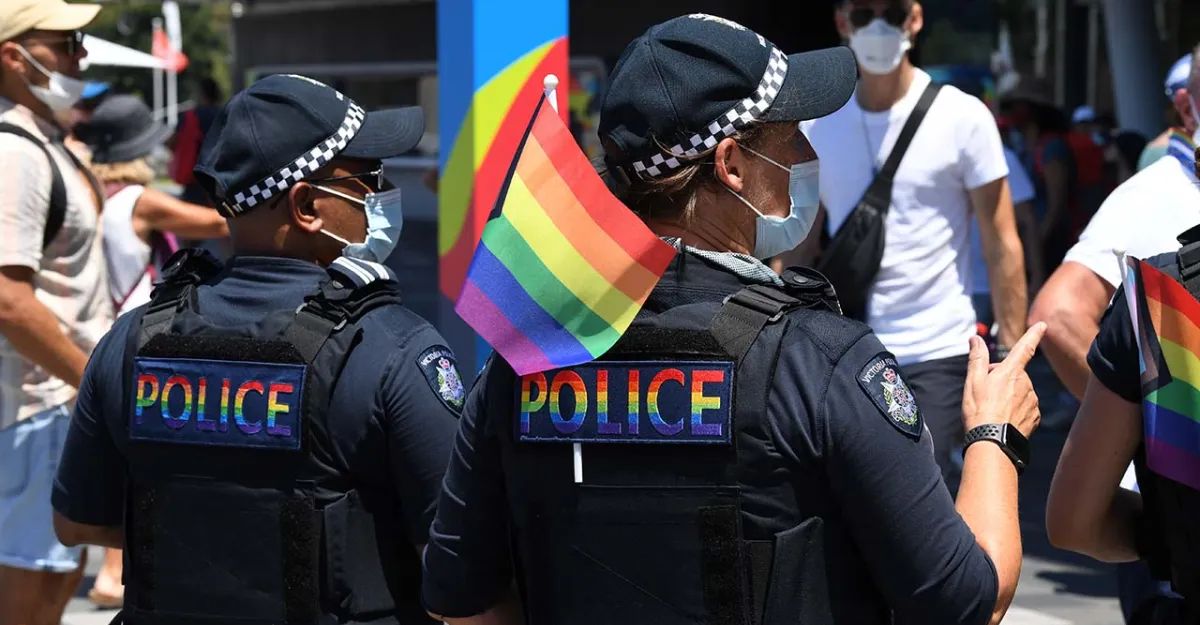Consider these six points:
1. Across history, there has been a long record of the state shifting issues of sexual health into the carceral sphere for the purpose of building the idea of the nuclear family, and encouraging support of the national project. Nowhere has that become more pointed than in the police response to the Australian covid-19 lockdowns, and the kind of strategies taken to prevent movement and intimacy. Indeed, as many epidemiologists and HIV activists have pointed out, many of the same missteps have been taken that marginalised affected communities in the 80s.
This in particular has resulted in a site of contestation for queer people. It’s a difficulty that has been hard to articulate, and we can see echoes of that response today with how queer identity has been re-negotiated under Covid-19. For example, the more recent introduction of the ‘singles bubble’—a successful way to mitigate loneliness pioneered with the NZ lockdowns—was quickly reneged by Gladys as numbers climbed over 400, with ‘singles’ being asked to register the name of their partner. The idea of sexual intimacy is, apparently, the reward granted to those who accept the monogamous, heteronormative model of coupling. In more recent health warnings, condescending infographics were distributed throughout social media by NSWhealth, advising citizens that sexual liaisons did not count as a ‘compassionate reason’ to visit others.
2. The police as we know it were created in the early years of British capitalism for the purposes of crushing worker and slave revolt, and were quickly assigned to the moral task of ensuring that workers did not stray from the family. The aftershock of this ruling appeared in curious places during lockdowns. If workers fucked, drank, or went out at night it needed to be under the supposed auspices of controlling crime, with no clear benefit to the working class.
3. This continued into the modern era, but following the varied social movements of the 1960s and 1970s there was a push back against this model of criminalisation in regards to sex work, abortion, homosexuality, and drug use. This would inform the idea of harm minimisation that came crashing up against the indifference or outright hostility of most governments during the early days of the HIV crisis, when the message from our community was that harm minimisation is what works. Some NGOs even predict that the end of HIV in so-called Australia is on the horizons.
4. The Covid-19 crisis has seen a return to a law and order approach to health. The government declined to implement Covid leave for workers across the board—with a particularly blatant example of sex workers left out in the cold—and instead gave us fines, and social shaming with the expectation that we would police each other. This does not end with the attacks upon migrant workers in Adelaide, but a habit of ritual shaming within the queer community that is out of step with our own arguments on harm minimisation models that encourage honesty and subsequent testing. Despite claims from the NSW police that the force has reformed since the original attacks on Mardi Gras, much of the same rhetoric lives on in their approach.
Governments across the world hurtled into a nearly unparalleled medical crisis in 2020 as Covid-19 transmitted amongst the general population. So-called Australia was no exception, and in the early days took an approach that favoured border controls and racial profiling with the proposal to put travellers from China on Christmas Island. As it became clear how infectious Covid-19 is, the Labor and Liberal politicians in the National Cabinet put forward a carceral approach to health care. This involved fines for ordinary people who ‘misbehaved’, but no expectation that profits would be sacrificed by expecting businesses to offer Covid leave to symptomatic workers who needed time off to test and isolate. Gladys had been quoted saying, ad infinitum, that ‘those who need support should not feel like they have no support’ while tangibly offering little.
The media was laden with messages of ‘we’re all in this together’, that it is the responsibility of ordinary people—not the government—to beat the virus. This is obviously cruel. A lack of support for workers has seen migrants left to starve with those who continue to work due to economic pressure are shamed and intimidated. Sex workers were also provided with fines—rather than appropriate economic support—and some needed to turn to fundraisers to make ends meet. This is a punitive strategy whereby precarious workers are penalised as a substitute for health measures, meanwhile corporations like Coles and Woolies rake in even more profit than usual.
On 60 Minutes the prime minister argued that the government aren’t the ‘fun police’, but their messaging on people’s leisure and recreational activities encouraged an individualistic approach that centred suppressing our entertainment while fast tracking fossil fuels and land development. The prime minister and health minister used the example of beach attendance to argue that it was our personal moral compliance with leisure restrictions that was lacking, and responsible for transmission. Hotlines were set up where people could dob each other in for misbehaving, and people on social media would accuse each other of being murderers if they breached the police guidelines. There is an implied homophobia behind these responses, and the restriction of anyone who might pursue less traditional relationship structures. Rumours were abound that a liaison between a medihotel visitor and someone from ‘Grindr’—which Yen Pham refers to in her piece ‘In the penal colony’:
There were allegations of insufficient PPE and regard for safety protocols, and, more luridly, of guards having sex with their charges. That last claim was never confirmed, though it spread quickly, for obvious reasons. It is true, anyway, that in at least two cases guards were dismissed for ‘overly friendly’ behavior.
This attitude of interpersonal policing, and moral compliance was also internalised within our own LGBTIQ+ communities. Traditionally, the experience of the HIV epidemic has encouraged a strong culture of openness and testing in our spaces, rather than attempting to unsuccessfully guarantee abstention via tools of shaming and policing. But our long experience has shown the strategy of shaming or abstention has been counterproductive as a persuasive tool. Much like with beaches, people will continue to have casual sex but the question is if they are willing to tell us about it and assist in tracing.
ACON—understandably given the crisis—put forward a position arguing for abstention from casual sex in the early days of the crisis. While the efficacy of an abstention message over harm minimisation messaging is not clear, it does signal a significant shift in how our community. Much more sharp, and troubling, has been the ‘gaysovercovid’ group which has mainly manifested in the US context which—despite the increase prominence of #DefundthePolice—has ranged from cheering on the LAPD for crushing gay events to doxing health care workers to using fake Grindr accounts to send groups of men to a trans woman’s apartment. That the desire for sex, or to walk on the beach, does not outweight safety is not at question, but these suppression strategies generally do not work for other issues.
5. While I don’t believe that people are just entitled to sex and I support people being responsible with their health, and engaging in social distancing and sanitary practice, it has never been reasonable to expect the new-found argument by sexual health NGOs for abstention from sex to be followed to the letter. And it wasn’t. Just like in every other moment of history. However this hasn’t stopped people in our community from attempting to shame those who cannot cope with isolation with things like gaysovercovid or whatever.
6. The lesson that our community should’ve been able to offer during the crisis is that the police are not health professionals, and health outcomes cannot be provided by abstention messaging and punitive measures. The police have used the justification of themselves as health professionals to shut down our protests—even while allowing malls to flood with customers. Instead we should’ve been on the front foot arguing for leave, and a promotion of testing which has been in massive decline in NSW.
Image: Imogen Cunningham, Unmade Bed (1954)



